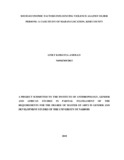| dc.description.abstract | This was a descriptive study on the socio-economic factors influencing violence against older persons in Marani location, Kisii County. The elderly population in Africa is increasing in line with global trends. The number of people over 65 years in sub-Saharan Africa is currently estimated to be over 35 million. The elderly can expect to live longer than they did two years ago. Specifically the study set out to: describe the forms of abuse against elderly persons, investigate the social factors contributing to the abuse of the elderly persons and to determine the economic factors that influence violence against the elderly persons. The study reviewed literature on prevalence and types of violence against the elderly, the socio-economic factors and cultural factors influencing violence against older persons. The study was guided by situational theory, symbolic interactionist perspective and aging and role accumulation theory. The population of this study was the elderly men and women and the unit of analysis was the individual elderly person and was conducted in five sub-locations. The study consisted of 133 elderly men and women aged above 65 years randomly sampled. Purposive sampling was used to select the key informants for the study. The key informants included the Chiefs, Village elders, Social Development Officer, County Officer in Department of Elderly, Community Health Volunteers and a Help Age International official. Questionnaires were used to collect data from the elderly and key informant interview guide was used among the key informants. Quantitative data was analysed with the aid of the Statistical Package for Social Science (SPSS) Version 20 while qualitative data was analysed thematically in line with study objectives. The study findings indicate that majority of the elderly experience abuse and neglect through action or inaction by persons known to them. The abuse and neglect causes harm or risk of harm to the elderly persons. When there is an expectation of trust, the consequences can be particularly harmful. Elder Abuse includes physical, mental or emotional harm, or damage or loss in respect of financial affairs. The emotional or psychological abuse includes, but is not limited to, verbal assaults, insults, threats, intimidation, humiliation and harassment. Some examples of emotional or psychological abuse may also consist of actions such as treating an older person like a child; isolating the older person from his or her family, friends, or regular activities; giving an older person the silent treatment; and enforced social isolation. The study recommends that comprehensive public awareness campaigns be carried out, to inform the public that violence against older persons is harmful and against the law, and that sources of help exists. | en_US |



